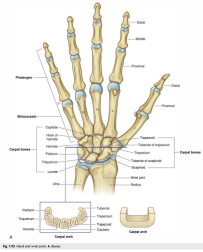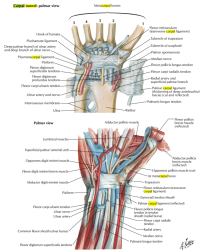Carpal Tunnel: Difference between revisions
Jump to navigation
Jump to search
No edit summary |
|||
| (5 intermediate revisions by the same user not shown) | |||
| Line 1: | Line 1: | ||
[[Carpal Tunnel Syndrome]][[File:Hand and wrist joints, bones.png|thumb|252x252px]] | |||
==Boundaries of the Carpal Tunnel== | ==Boundaries of the Carpal Tunnel== | ||
* '''Roof''': Flexor retinaculum. | * '''Roof''': Flexor retinaculum. | ||
| Line 8: | Line 9: | ||
*'''Medially''': It attaches to the pisiform and the hook of the hamate. | *'''Medially''': It attaches to the pisiform and the hook of the hamate. | ||
*'''Laterally''': It attaches to the scaphoid tubercle and the trapezium. | *'''Laterally''': It attaches to the scaphoid tubercle and the trapezium. | ||
[[File:Carpal tunnel.png|thumb|252x252px]] | |||
== Pressure within carpal tunnel == | |||
{| class="wikitable" | |||
!Pressure (mm Hg) | |||
!Description | |||
|- | |||
|<20 | |||
|normal | |||
|- | |||
|20-30 | |||
|venular flow retarded | |||
|- | |||
|30 | |||
|axonal transport impaired | |||
|- | |||
|40 | |||
|sensory & motor dysfunction | |||
|- | |||
|60-80 | |||
|blood flow ceases | |||
|} | |||
Latest revision as of 10:24, 13 June 2024

Boundaries of the Carpal Tunnel
- Roof: Flexor retinaculum.
- Floor: Carpal bones (hamate, capitate, trapezoid, trapezium, pisiform, triquetrum, lunate, and scaphoid).
- Medial Boundary: Pisiform and hamate bones.
- Lateral Boundary: Scaphoid and trapezium bones.
Attachments of the Flexor retinaculum
- Medially: It attaches to the pisiform and the hook of the hamate.
- Laterally: It attaches to the scaphoid tubercle and the trapezium.

Pressure within carpal tunnel
| Pressure (mm Hg) | Description |
|---|---|
| <20 | normal |
| 20-30 | venular flow retarded |
| 30 | axonal transport impaired |
| 40 | sensory & motor dysfunction |
| 60-80 | blood flow ceases |